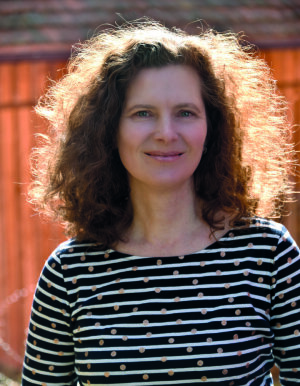The human superpower
Dr Ute Schönfelder, Editor, Section Communications and Marketing
Image: Anne Günther (University of Jena)Now, hand on heart, what do you think of when you hear the term »romantic«? Sunsets, idyllic landscapes, candlelit dinners? You are probably not alone in this, and yet you are far from the essence of the Romantic era. Because this period does not reveal itself only in its lyrical, mystifying or melancholic view of the world. On the contrary, the literature and art of Romanticism have made us aware of our imagination, opened up space for thought and reflection, and in this way enabled completely new forms of artistic expression.
This year is the 250th anniversary of the birth of German romantic poet and philosopher Novalis, who studied in Jena, among other places. To mark this event, the current issue of LICHTGEDANKEN is turning its attention to this era. Romanticism shaped modernity and in Germany, it all began at the University of Jena, where researchers are currently engaged in a wide variety of projects on this topic. In interviews and articles, we examine Romanticism in literature and the visual arts, and trace its continued effects on today’s politics and society.
Like the people from the early Romantic period, we too are currently facing huge challenges. Whereas at the beginning of the 19th century, these were the radical changes resulting from the French Revolution, which affected the whole of Europe, today it is the climate crisis or the ongoing coronavirus pandemic that demand new political and social courses of action and structures. During this process, we have to endure uncertainties and recognize that empirical knowledge takes time to grow, while at first it often appears contradictory. Nevertheless, we have to make decisions—even if we do not yet know every detail of the possible consequences. In this issue of LICHTGEDANKEN, you can read a commentary on the fact that such »non-knowledge« is not necessarily a flaw, but can even be an advantage in many areas of life. Researchers at our university also provide information on how they share both knowledge and non-knowledge with the general public, and explain why we need science communication—also and especially in view of doubts and scepticism regarding science.
Doubts and uncertainties are self-evidently part of science. The pandemic shows that this also applies to social interaction: we are those affected and those who observe, researchers and research subjects at the same time. To be aware of this ambivalence and to keep changing perspectives, to consider both the individual and the whole, and to do this not always only seriously, but also playfully or with a touch of irony—all this is what Romanticism teaches us. Let us make use of its legacy! In dealing with the challenges of our time, let us trust scientifically proven methods and empirical data as well as our imagination—the unique human superpower!
I wish you a stimulating read and welcome any feedback, suggestions or criticism. You can contact me and the editorial team at: presse@uni-jena.de.
